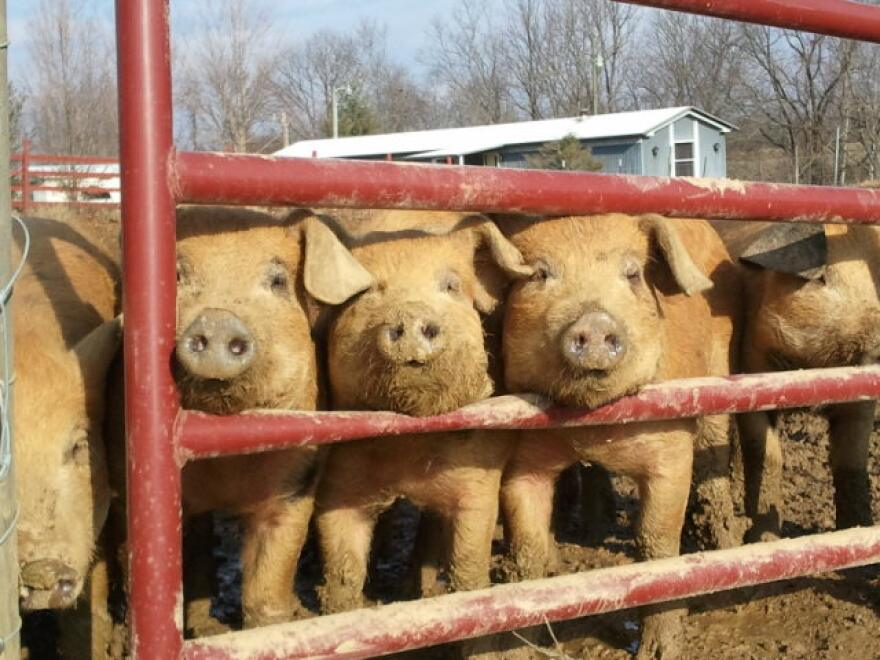Single-sex education is a time-honored approach in the traditional classroom, but a workshop in Napoleon, Kentucky, is extending the trend into the kitchen. Grrls Meat Camp will offer a hands-on modern butchery class just for women April 12-14 at Napoleon Ridge Farm, between Louisville and Cincinnati.Farmer Tricia Houston, master butcher Kari Underly and camp founder Kate Hill from culinary retreat Kitchen-at-Camont in Gascony, France, will lead the course. The workshop is designed for women working with meat on farms and ranches, in butcher shops and in restaurants, but is open to any interested woman.“Master butchers make it look so easy, seamless, like the knife knows where it's going,” said Kate Yelvington, a farmer who attended a Chicago Meat-Up last winter. “Then I take the knife, try to remember the proper grip and angle, and attempt to remember all of the natural seams and muscles, how the bones connect and at which rib to makes my cuts for primals. There's nothing worse than the looming possibility of butchering, in the worst sense of the word, a beautiful loin because you forgot how deep and at what angle to cut around the vertebrae. It's a learning process, and so far I've had very patient teachers.”When I visited Kitchen-at-Camont three years ago, Hill took this brand new omnivore (a nine-year vegetarian) and put a knife in my awkward hand the day I arrived. By the time I left two weeks later I was elbow-deep in duck carcasses and full of excitement about getting hands-on with the meat Kentucky farmers were raising.My “camp confit” with Hill was composed of women, but by happenstance, not rule. So why limit this camp to women? “Frankly, sometimes there is an intimidation factor when men and women are in a learning environment,” Houston explains. “Men muscle in and women step back and don’t get to have the entire learning experience. This barrier goes away when it is a woman-only classroom.”Kate Yelvington, a farmer who attended a Chicago Meat-Up last winter, agrees. “I was pretty nervous going into the weekend, particularly after I looked at the roster and saw who was going -- chefs, butchers, authors, James Beard nominees. It was intimidating, to say the least," she says.But Yelvington says she warmed up to the event at the opening night dinner, when the women gathered with "none of the ego that, let's face it, is often associated with men in the food world.""You know, all that 'my knife is bigger' stuff," adds Yelvington. "Not only are these people heavy hitters in their industries, but they are women making names for themselves. It's inspiring.”Houston missed the Chicago event, so she approached the organization to see if they might come to her farm for an event. She specifically wanted to have it on her farm instead of a kitchen or restaurant. “This brings it back to the animals and understanding where your food comes from, instead of just having a carcass show up in front of you to butcher,” Houston says.For Melody Nye, a Michigan farmer who also attended the Chicago Meat-Up, holding the camp on a farm allows participants to understand what the farmer-animal relationship to the end. "It demystifies the process,” she says.Houston, the farm host, agrees. “I want to know as much as possible about the uses for my animals, and that means understanding all the ways the meat can be used," says Houston. "The cuts that come from each animal, and the value added products that can be made from the animal."That's right -- it's not all about the perfect steak. Lard, sausage, head cheese, terrines, pickled pigs feet -- it's all on the butcher's block in these events.“It's of paramount importance not to waste any part,” adds Nye. “From a humane standpoint, but also from a profit perspective.”That's the goal of sessions at the camp like Anatomy 101: the cutting chart brought to life; cutting sub-primals into modern cooking and charcuterie cuts; beef curing, pickling, smoking, and drying; cooking with offal; and tete to tail cochon: whole hog in the traditional French way.The cost to attend - $875 - is steep, but Nye says she found a “huge return on investment” when she went to Chicago.“Knowing that it takes every part of the animal to make the farm successful … going to an intensive workshop like this and learning the value added pieces and adding that [skill] as an option to a small struggling farmer … that's the return!” she says.And they're not only breaking down animals at these events. “It's primarily males in butcher shops who like to tell us our business,” says Nye. “We can break down that old boy network."The weekend includes opportunities for a wider audience as well. An informal regional women's Meat Up Friday before the camp, 6-9 p.m. at the Ramada at Sparta, is free to attend. And a $40 “Guyz AND Grrls BBQ” fundraiser potluck Sunday is open to anyone (though limited to 120 people). This event raises money for future meat camp scholarships.
Women Breaking Down Hogs, Beef and the 'Old Boy Network' in Kentucky Butchering Camps


